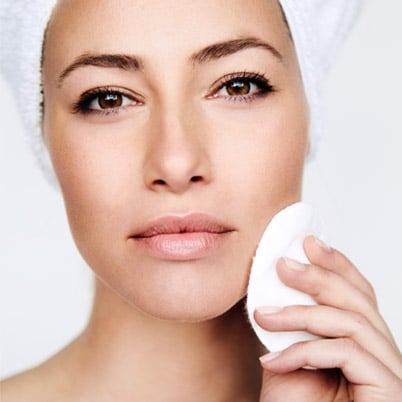Once upon a time, exfoliating meant using one of only the few scrubs out there and calling it a day. That's no longer the case, thanks to an influx of cleansers, boosters, serums, toners, peels, lotions and masks (you get the picture), all touting their own exfoliating benefits and the promise of radiant skin. But as the saying goes, all things in moderation. Turns out it's -- very -- possible to over-exfoliate, and end up with skin that looks more gross than glowy. Ahead, the signs that indicate it's time to ease up on the exfoliation, plus the best sloughing solutions for any and every skin type.
Image via Getty
Image via Getty
Typically, there are three different ways by which someone ends up OD-ing on exfoliation. "People who use physical exfoliants think if a little bit is good, a lot is better. They end up scrubbing away not only the dead skin cells, but the live cells as well," explains New York City dermatologist Dr. Neal Schultz, host of DermTv.com and creator of BeautyRx by Dr. Schultz. Translation: Over-zealous scrubbing done too frequently.
The second type is excessive chemical exfoliation, which most often happens when people buy non-vetted products on the internet that contain extremely strong concentrations of acids, Schultz adds. (We're talking black-market type stuff that you can't get elsewhere.)
And finally, there's the type of gradual and cumulative over-exfoliation that occurs when every product in your skincare routine has some kind of exfoliating ingredient in it.
Image via Getty
The second type is excessive chemical exfoliation, which most often happens when people buy non-vetted products on the internet that contain extremely strong concentrations of acids, Schultz adds. (We're talking black-market type stuff that you can't get elsewhere.)
And finally, there's the type of gradual and cumulative over-exfoliation that occurs when every product in your skincare routine has some kind of exfoliating ingredient in it.
Image via Getty
In the case of the first two scenarios, you'll most definitely know. The irritation from too much scrubbing looks similar to how your skin looks post-wax -- red and raw. If you use too strong of a chemical exfoliant, the result is a chemical burn, which may even start to blister, notes Schultz. And if the excessive exfoliation occurs overtime rather than in one hit, your complexion will simply gradually start to look and feel red, dry, and flaky. "Too much exfoliation strips away the lipids and proteins that are essential for keeping the skin barrier intact and locking hydration in and irritants out," points out Mona Gohara, M.D., associate clinical professor of dermatologist at Yale School of Medicine. "If you've overdone it, your skin will start to become easily irritated by every minor little thing."
Image via Getty
Image via Getty
If you've gone overboard with physical exfoliation (so, scrubbing too hard and/or too often), you can also end up with clogged pores. Ironic, given that this is probably one of the things you're trying to remedy with said scrubbing. "Too much physical exfoliation can lead to a thickening of the skin, which can lead to clogged pores," explains Schultz. OK, that's all the bad news we have for now. The good news: Follow the easy exfoliating routines coming up next, and you won't have to deal with any of the stuff we just talked about.
Image via Getty
Image via Getty
You can really take your pick between chemical or physical exfoliation, says Gohara, though she recommends a little bit of both. She suggests using a retinoid nightly; not only is it an effective exfoliator, but it also packs a hefty anti-aging punch. Our pick: Differin Gel, $11.29. If you want a little extra boost, add an electric cleansing brush, like Mary Kay Skinvigorate Cleansing Brush, $50, into the mix a few times per week, she adds. Pair it with your normal cleanser and let it do the work for you, gently buffing off dead skin cells.
Buy now
Buy now




